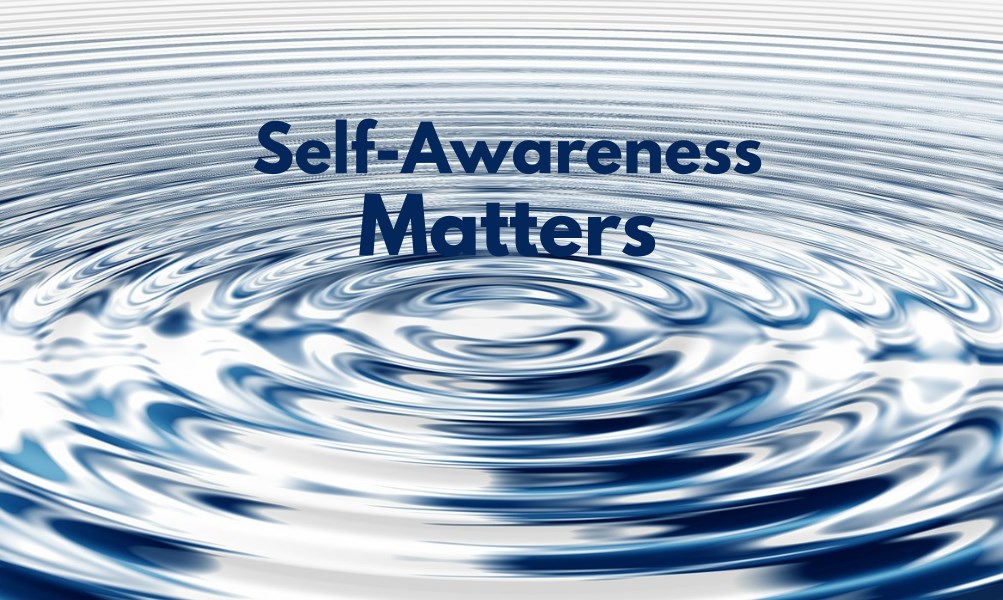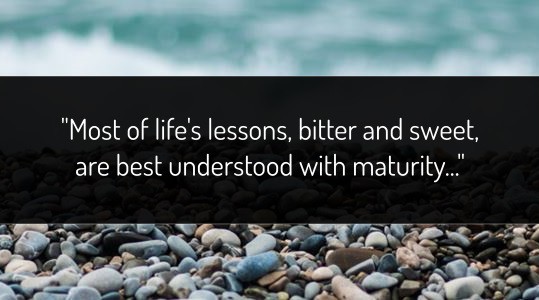
Savvy YouCultivate Self-Awareness
Self-awareness is a concept I’ve often encountered in business articles. As it turns out, it’s a lot more than a catchall phrase. It is an intuitive concept that’s easy to understand. However, it would be a mistake to take it at face value as I did for a long time before I began my research for this article.
Self-awareness refers to our ability to recognize our emotions, abilities, habits, and motivations as they play out in our day-to-day lives. It means knowing ourselves and being self-aware as we carry on with our daily activities. It is not the same as being hyper-sensitive or overly self-conscious. While these are signs of insecurity and unresolved emotional issues, self-awareness is a skill that contributes to a healthy state of mind and a healthy sense of self.
At first glance, it would seem that self-awareness and self-knowledge are one and the same. In some ways they are. Though to my mind, they’re not exactly the same.
There’s something passive about the way we speak and think about self-knowledge. While self-knowledge suggests a state of passive (even static) knowing, self-awareness is active. It is a skill to be applied and improved upon daily to enable us better navigate the private and public spheres of our lives. This in-the-moment dimension of self-awareness is what makes it different from the age-old idea of knowing oneself or having self-knowledge.

WHY SELF-AWARENESS IS IMPORTANT
Our Self-Awareness (or lack thereof) has impact beyond our private affairs. It affects our relationships and our competence at work. This is because it is deeply connected to another very important skill; Emotional Intelligence.
EQ, as it is called, has been shown to be a critical determining factor of overall success in life. This is why contemporary business, productivity, leadership and wellness writers often make reference to it.
Emotional Intelligence refers to a group of competencies that enable us connect with and relate to others in a healthy, mutually beneficial way. According to Daniel Goleman, who introduced it to the public in his 1995 book, Emotional Intelligence is composed of 4 main competency areas beginning with Self-Awareness. Self-awareness is a critical part of what is known as ‘Self-Competence’.
Equally significant is the fact that self-awareness facilitates positive behaviour change and better self-management. As Paul Jun observed, this is why self-awareness practices are part of therapeutic and behaviour change programs like Alcoholics Anonymous.
Self-awareness has also been tipped as a skill that enables effective leadership. I have read so many articles about this and it makes a lot of sense. Good leadership is a balance that requires the leader to lead herself as well as others. Better understanding and leading of oneself will ultimately enable better understanding and leadership of others. [Check out this article which draws on Arianna Huffington’s experience to make a connection between sustainable leadership and self-awareness.]
Finally, self-awareness and Mindfulness (they are often used interchangeably) have been scientifically proven to enhance mental and physical wellbeing. It is a skill that helps us cope with the dynamics (the highs and lows) of life.
WHAT SELF-AWARENESS CAN DO FOR YOU
Self-awareness has many benefits. Some of them are direct benefits and others are a bit like knock-on effects.
-1-
As I already mentioned, self-awareness enables self-guided behaviour change. It helps us improve our habits, behaviour and ultimately our character. And it does so by helping us recognize the things that make us think, act and behave the way we do. This knowledge then empowers us to see what we need to change or improve about ourselves.
``Awareness is the foundation of any change. Before you can change, you must have a cognitive understanding of what you’re trying to change and why.``
-2-
Self-awareness facilitates learning and personal growth for adults and children. In this article, Daniel Goleman writes about how Social and Emotional Learning programmes, designed to teach self awareness and emotional intelligence, have been implemented in many schools (within and outside the US).
These SEL programmes continue to have far-reaching positive effects. They have also been adapted for violence prevention and school discipline. Research also shows that these programmes have led to improved academic performance.
-3-
Self-awareness improves our performance at work. The reason is simple. When we are aware of how certain things affect us at work, we can choose how to respond. Furthermore, we can enhance positive factors over negative ones and that can improve our overall productivity.
``when someone is aware of how feelings affect his reasoning, thinking and ways of interacting with other people - he has self-awareness.``
-4-
Leaders who are self-aware are far better leaders than those who are not. This is true whether you think of leadership within the context of governance, as a dimension of business, or as a factor in interpersonal relationships. Experts agree that self-awareness is a very important component of leadership.
This is something many organizations have known for a long time. Daniel Goleman found that many organizations have made self-awareness a part of the Leadership competency models which they use to assess candidates for employment and promotion.
This explains some of the questions that have become popular at job interviews. Questions like: ‘Looking back, what would you consider your worst mistake and what would you do differently?’ and ‘What do you think is your greatest career accomplishment and how did you achieve it?’. These questions are designed to assess a candidate’s self-awareness among other things.
``Self-awareness is having the open-mindedness to better understand how people perceive you, and being aware of your attitude and your responses to them moment-to-moment.``
-5-
Self-awareness improves quality of life significantly. Wellness experts link it to happiness and resilience. Again, it’s easy to see why.
Thinking about it in the simplest sense, it’s easy to see how a person who is self-aware is better able to seek out things make her happy and content.
Looking deeper, self-awareness practices can help us achieve happiness in many ways. They help us manage the strains of stress, they unburden the mind emotionally, they nurture true self-knowledge, they encourage self-acceptance, they build self-confidence and these in turn propel the individual to achieve her potential.
Taken together, these are the things that form the core of lifelong happiness.
``Self-awareness involves being mindful of your thoughts and feelings, your coping mechanisms, your strengths and vulnerabilities, and most importantly, the values that motivate your goals and actions.``
-6-
Finally, Self-awareness helps people cope with trauma and emotional distress. This is especially true of conditions that are worsened by particular physical or emotional triggers.
Psychological therapy to deal with anxiety disorders, Post-traumatic stress syndrome, depression, anger management, etc often include practices designed to enhance self-awareness.
HOW TO DEVELOP YOUR SELF-AWARENESS
There are many things you can do to cultivate self-awareness. From my research, I learned that common practices like meditating and keeping a journal actually improve self-awareness. Kevin Rafferty lists things like Gratitude and Forgiveness, and Dr Suzannah ward mentions reading and seeking help as more ways to improve self-awareness [PDF]. I think these 4 are worth trying today:

<< 1 >>
Contemplation & Reflection
It always helps to think about who you are, who you are becoming, the most important events in your life and who you aspire to be. Kevin Rafferty writes that its important to know and understand your own life-story. Indeed, it is impossible to become self-aware without reflection. We shouldn’t wait for a crisis to make time to reflect.
For many here in Nigeria, going to a place of worship is one way to make time for reflection. Keeping a journal is another way to make a habit of reflecting on the course of events in your daily life. It’s not enough to do it once or twice. It has to be cultivated so that it becomes a habit.
``Self-awareness is a practice, a muscle that grows with time and effort that ultimately provides us strength.``
<< 2 >>
Meditation
Mindfulness is a meditative practice that is credited with radically improving self-awareness. Infact, many writers treat them as one and the same. Mindfulness has its roots in Buddhism but is not a religion.
The purpose of Mindfulness is to learn to observe the inner workings of one’s mind without judgement or bias. As it is described, the more we become aware of thoughts and emotions as they arise in our minds, the more we come to understand that we are not our thoughts. We can let go of negative thoughts and cultivate positive ones.
Many Mindfulness meditations involve breathing exercises. Before you let your inner sceptic dissuade you, consider this: breathing techniques help people deal with and progressively recover from Anxiety attacks and Post Traumatic Stress Syndrome.

<< 3 >>
Assess your beliefs & Values
What motivates you? why do you believe what you believe? Which bad decisions or indecisions were made because of certain beliefs? These are the kinds of questions you can ask to assess your belief and value systems.
As Kevin Rafferty points out, much of what we see, experience and expect in life are based on our beliefs. It makes sense that we should deeply understand our beliefs and values in order to become truly self-aware.
<< 4 >>
Seek Feedback
Finally, it’s not always easy to see and understand ourselves by ourselves. Sometimes, it helps to see ourselves through other people’s eyes. This is how seeking feedback can help us become more self-aware.
It could be a co-worker at the office, a close friend or a relation. It could be your child, your niece or your sibling. Getting feedback can sometimes help us see our blindspots. It can help us understand what matters and where we need to focus in order to change outcomes or habits.
POSTSCRIPT
It would be a mistake to take self-awareness for granted. It is a soft-skill and in many societies (like in Nigeria), soft skills are not taken seriously. However, when I think about how stressful day-to-day living can be, and how much pressure we experience, it is clear that Self-awareness, mindfulness and other wellness practices need to be taken more seriously.
Researching this article was an eye-opener. I had always assumed self-awareness was a new name for something I knew all too well. I was pleasantly surprised to learn that there was more to it than I thought. And I am glad that I have learned something that can improve my life as an individual and a business owner.
-
10Mar
5 Life Lessons Shared
Life lessons are subtle yet powerful. And while they are true, they're certainly not true in exactly the same way for everyone. That life and its less...
-
24Jan
5 Trends Creative Entrepreneurs Will Enjoy in 2017
Hurrah!
We made it through 2016 in one piece. There were a few trends that suggest many of Nigeria's creative entrepreneurs made good progress i...





Sorry, the comment form is closed at this time.